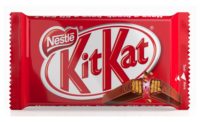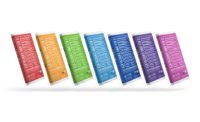Nestlé International Travel Retail (NITR) is set to launch the first KitKat made with cocoa mass from beans grown by farmer families engaged in the company’s Income Accelerator Program to European travel retail.
The new ‘Breaks for Good’ KitKat aims to connect traveling consumers with the farmers in Nestlé’s ground-breaking program. At the same time, it will raise awareness about the sustainability of the cocoa used in the iconic bars.
The KitKat wrapper will include a bold "Sustainably Sourced Cocoa" stamp and a QR code which will direct consumers to further details on the program and its immense impact on the lives of cocoa farming communities.
Chocolate made with sustainably sourced cocoa will be used in the majority of KitKat products available in European travel retail, including KitKat’s new Destination Packs, KitKat Chunky, Mini Mix, and its popular Sharing Bag. The new products are expected to be rolled out over the coming months, with their launch supported by an extensive "Breaks for Good" campaign.
NITR General Manager Stewart Dryburgh said: “KitKat is a key brand, not just for us, but generally in the travel retail Confectionery category."
“KitKat has consistently embraced innovation, centered around its iconic ‘Have a break, Have a KitKat’ tagline, and is now taking a huge step to embrace sustainability. ‘Breaks for Good’ puts cocoa farmers—and our mission for a sustainable future for all involved in the cocoa and chocolate production chain—at the center of our products. And, of course, to the center of the Confectionery category in travel retail."
“KitKat is such a noticeable brand, perfect to represent Nestle’s efforts to create meaningful impact in cocoa communities.”
Nestlé’s Income Accelerator Program (IAP) was launched in January 2022 to help close the living income gap of cocoa-farming families and reduce child labor risk by encouraging changes in behavior and rewarding positive practices—both within the home and on the farm. At the same time, the program strives to encourage better agriculture practices. Payments are divided evenly between the male and female heads of household, empowering women to act as agents for positive change by saving, investing, and sharing responsibilities.
The IAP was introduced to build on the learnings of the Nestlé Cocoa Plan which was launched back in 2009. It has engaged more than 150,000 cocoa-farming families so far, building on three pillars: better farming, aiming to improve livelihoods in communities; better lives, aiming to improve social conditions for families; and better cocoa, aiming to improve product sustainability. The IAP builds on Nestlé’s ambition to transform its global cocoa sourcing and achieve full traceability and physical segregation of its cocoa product from origin to factory.
Cocoa-farming communities face immense challenges, from rural poverty and increasing climate risks to a lack of access to financial services and basic infrastructure, such as water, health care and education. These factors can lead to social issues, including the prevalence of child labor risk on family farms. By helping families close the gap to a living income, Nestlé, through its Income Accelerator Program, aims to tackle child labor risks and deforestation.
The program incentivizes cocoa-farming families that enroll their children in school, implement good agricultural practices, engage in agroforestry activities, and diversify their incomes. The program rewards cocoa-farming families not just for the quantity and quality of their cocoa beans, but also for practices that benefit the environment and local community.
The program has so far supported over 10,000 families in Côte d’Ivoire and is expanding to Ghana this year to reach some 30,000 families. By 2030, Nestlé intends to reach an estimated 160,000 cocoa-farming families in the company’s global cocoa supply chain to create an impact at scale.
Nestlé has collaborated with various partners and suppliers to transform its global cocoa sourcing and achieve full traceability and physical segregation of the cocoa sourced from its income accelerator program. This means being able to track the entire journey of cocoa beans from origin to factory, while keeping them physically separated from other cocoa sources.
According to Nestlé, the cocoa mass from the Income Accelerator Program adheres to one of the highest traceability standards, ensuring "mixed identity preserved" traceability, enabling cocoa to be traced and stored separately.
Commenting on Nestlé’s mission towards more sustainable cocoa sourcing, Cargill’s Product Line Director Cocoa & Chocolate Europe West Africa, Michiel van der Bom, said: “Cargill is committed to supporting Nestlé's longer-term goals and their progress on delivering the Income Accelerator Program. As a partner on Nestlé's sustainability journey, we are implementing solutions to source sustainable ingredients for Nestlé in ways that help restore the environment, support families, and increase incomes. Through our partnership, we are building a stronger, more resilient supply chain together.”
Rainforest Alliance Manager Strategic Accounts Thierry Touchais added: “We’re delighted to collaborate with Nestlé on their journey towards more sustainable cocoa sourcing. It’s encouraging to find a company of this scale using a ‘mixed identity preserved’ model in which cocoa can be traced back to Rainforest Alliance certified farmers engaged in Nestlé's income accelerator. The approach showcases the potential for positive change in the industry.”
By mid-2024, Nestlé plans to use segregated cocoa butter for all its KitKat chocolate in Europe, with plans to expand to other regions in the coming years.
Nestlé SA is on the current Candy Industry “Global Top 100 Candy Companies” list. Click here to view the current “Global Top 100” rankings.





